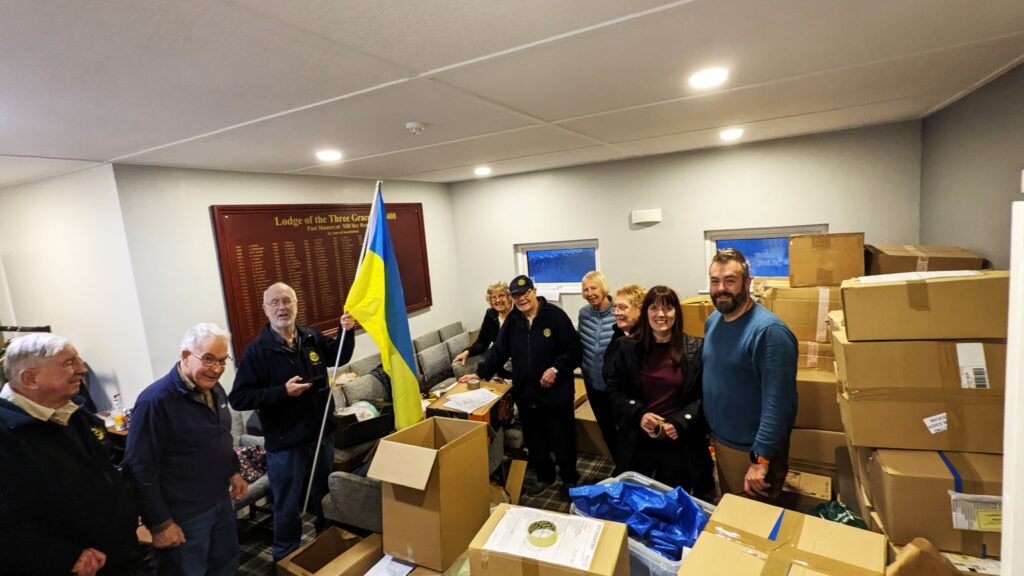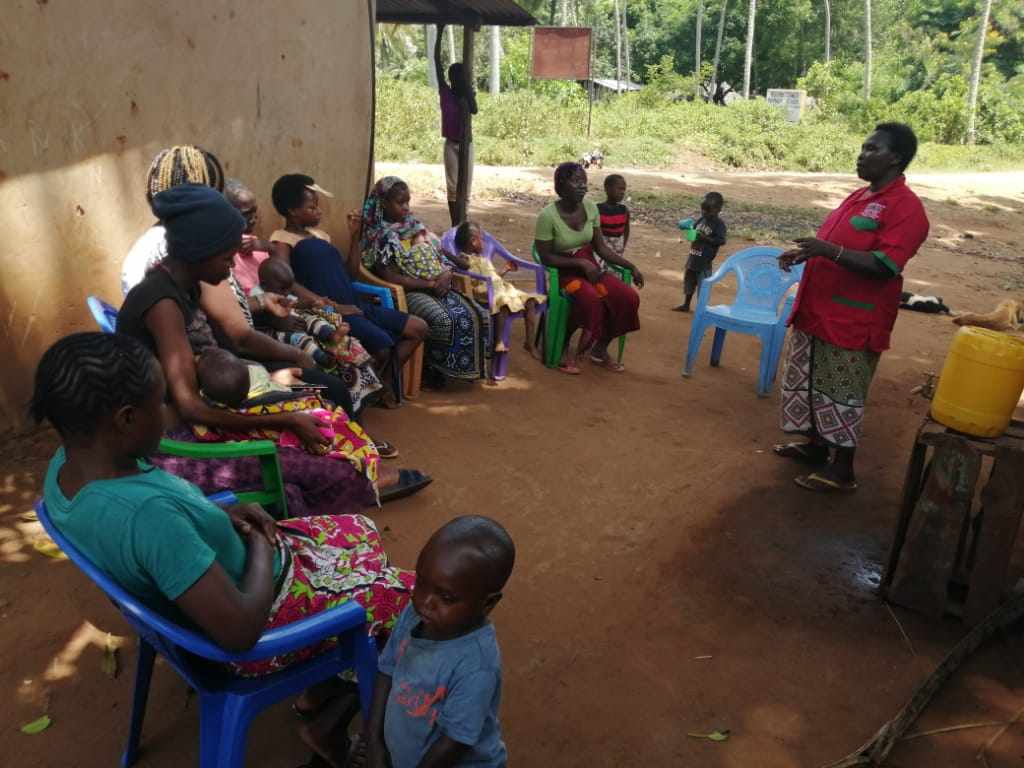It’s estimated that approximately 385,000 babies are born each day, over 140.5 million babies annually. Being born into war zones, into poverty, or born with a disability are some of the many challenges that millions of babies, mothers and families face today—requiring care and support to get through pregnancies, birth and the first years of life.
Rotary worldwide is working to save mothers and children, one of Rotary’s key causes, by making access to healthcare and education available to vulnerable or disadvantaged communities and groups. This month we look at how individual members and Rotary clubs across Yorkshire and North Lincolnshire support this cause on different continents. From providing essential equipment for infants in occupied areas of Ukraine, helping children take their first developmental steps in Leeds and saving mothers and children in rural Kenya, Rotary is there in support.
Keeping infants warm in times of war
Emilia Merenmies was in Brussels delivering training when the war in Ukraine began. She was asked to go to Ukraine to assist with evacuating children with special needs. With a professional background in international security, development, and humanitarian aim—and many contacts across countries—she was naturally suited for the task.
In September 2022, she joined Haworth and Worth Valley Rotary and immediately began using Rotary’s network of clubs and contacts to help get aid into Ukraine. Rotary clubs and contacts in areas such as Lviv, Zaporizhia and Kharkiv provided lists of essential items that were needed in occupied or recently invaded locations. In addition to personal items such as clothing, there was a need for shelter, generators, and specialist equipment to provide necessary healthcare.
Rotarians in Haworth and nearby areas sprang into action. They developed maternity and infant kits which included baby clothes, nappies, hygiene pads and other items for newborns and mothers. They also collected and delivered personal protection equipment, medical supplies and generators and purchased Aquaboxes While delivering items on one of these trips, Emilia learned that there was a real need for several more infant warmer stands at Kharkiv Regional Perinatal Center. These stands provide warmth to vulnerable infants that need extra support. Rotarians used their connections and negotiated discounted prices for six warmers which were paid for through an individual donor. Rotarians then organised their transportation to the hospital, and staff had them running within hours. The machines are portable, meaning staff can move them into secure locations in the hospital in the event of further bombings. With an average life span of nearly 20 years, they have the potential to help thousands of babies get the care and warmth they need for years to come.


Emilia reckons there are hundreds, if not thousands, of individuals and groups delivering aid to Ukraine. With so many people involved it is hard to know what people are doing and where items are to make the transportation process more efficient and economical. She learned that John Midgley, a member of Skipton Craven Rotary, was personally driving equipment and goods to Ukraine. The two connected and together, with their Rotary clubs, they have been working closely on the Ukraine Crisis Response—helping deliver over 100 generators, Aquaboxes and essential items over recent months You can hear Emilia talk more about the work in this radio interview
Giving young children in Leeds the best start possible
Much closer to home, Rotarians have taken a different path to support the health and development of children and their families.
Rotary Club of Leeds and Rotary Club of Edinburgh partnered with Leeds Mencap, an independent charity supporting people with learning disabilities, to provide specialist developmental support to young children ages 0 to four. There are 159,000 children aged 0-7 years old with a learning disability in the UK with many of these children and their families lacking necessary support.
Running from January to December 2022, the project helped 28 children by delivering 117 developmental play sessions focused on each child’s individual needs. The project aimed to improve children’s independence, communication, and physical development skills—skills that are fundamental in childhood development. By extension, the project was also designed to help parents, who are often the only carers for their children, by improving their confidence and reducing isolation.
The idea for the project came about after Leeds Mencap visited the club. According to Anita Rayner, Rotary Foundation chair for Rotary Club of Leeds, the club was impressed with Leeds Mencap’s achievements. Leeds Mencap CEO, Cath Lee, raised awareness over the needs of very young children who do not receive any official support in their development. This is a critical time in a child's life when most learning occurs. Children with disabilities and their families are at a particular disadvantage as public resources are often unavailable and private support is often expensive and scarce.
Funding for the project was made possible by partnering with Rotary Club of Edinburgh to receive a Rotary Foundation’s Global Grant—raising over £20,000 for the project. Leeds Mencap was able to hire three specialist early years practitioners for 15 hours a week, purchase specialist toys and equipment, and provide essential training for staff. Working with the specialist practitioners meant that the children were able to develop more than if they had been in a mainstream nursery setting. The programme focused on the individual needs of each child and resulted in the children being able to do new things–such as walk independently, feed themselves or be able to separate from their parents.
Though the project officially ended in December, its success has garnered interest from funders to continue this work. This additional funding will allow the three specialist practitioners to remain in their roles as Leeds Mencap widens opportunities and approaches to help children and their parents.
Saving mothers and babies in Kenya with healthcare and education
On the Eastern coast of Kenya there is a small charity making a big difference to local family and community health. Mama Na Mtoto UK, meaning Mother and Baby, was set up to address health inequalities in the area by providing support to mothers and babies before, during and after birth.
Anita Jones, Chair of trustees and founder of Mama Na Mtoto UK, first went to the area in 2012 to work on a project to reduce transmission of HIV from mother to babies. She found that access to good healthcare in the Kilifi region was difficult for all mothers regardless of their HIV status with costs being one of the main barriers. As a trained midwife and childbirth educator in Leeds and surrounding areas, she felt that every mother and child deserved to have adequate healthcare regardless of their ability to pay. She began looking at ways to create a more holistic approach to maternal and foetal wellbeing and in 2015 the charity was officially established.
As a small charity, Anita finds that funding the services is one of the biggest challenges. Rotary Club of Bradford Bronte has supported the charity several times over the years. Anita has become a friend to the club and several individual members are now personally involved in supporting the charity by volunteering in the Mama Na Mtoto charity shop in Keighley, becoming trustees and using their homes as drop-off points for charity shop donations. The shop not only serves as the primary funding source for the charity, but also supplies useful kits to the homeless community, new mothers, and others in need.

In Kenya, Rotary was also at work supporting the cause. The nearby Rotary Club of Mtwapa partnered with German Doctors, a charity which offers medical treatments in developing countries, to set up a birthing unit accessible to families in the five villages. This means they no longer need to travel over 30 kilometres to get the hospital. Instead, mothers-to-be can walk the unit and receive the attention and care they require.
The charity now has 60 members of staff and two social workers across five villages. In addition to supporting women before, during and after birth, the charity also provides essential education to mend and women of all ages around health, menstruation, consent, sextual exploitation, safeguarding and more. Local women and medical students from nearby North Coast Medical Training College deliver educational sessions to people in their communities and homes, ensuring that access to information is available to as many people as possible.
The work of Mama Na Mtoto continues to extend to all areas of local life. They’ve implemented running water in their maternity unit and a bore hole for easy, and free, clean water access for locals. They are looking at ways to provide better education around food and healthy eating and aim to provide families with gardening kits to grow their own fruit and vegetables. They are also looking at providing clinics with milk and biscuits to give the hungry children that accompany their mothers to appointments at the clinics.
Their established presence and commitment to the health of locals has created trust and credibility within the community. It is proof that change can be small and incremental, but over time it can make a positive difference to individuals and communities. As Rotarians we can keep this in mind as our actions—from responding to emergency situations to planning carefully considered projects with partners—can make all the difference to human life.
Rebecca A Mendoza is a freelance writer and member of York Rotary. You can learn more about her work at www.rebeccaamendoza.com